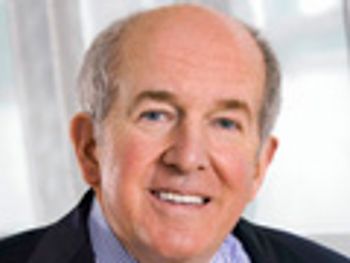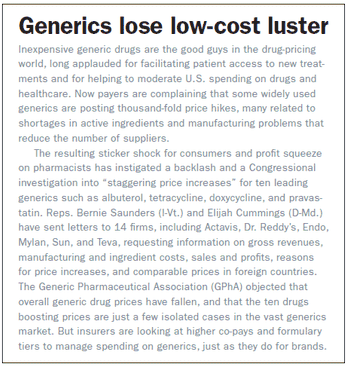
An expert CPhI Worldwide panel has identified "the good, the bad, and the ugly" in its forecast for the pharmaceutical industry for 2015.

An expert CPhI Worldwide panel has identified "the good, the bad, and the ugly" in its forecast for the pharmaceutical industry for 2015.

The "discussion draft" for legislation to speed "21st Century Cures" to patients emerged very quietly on Capitol Hill this week. Jill Wechsler reports.

FDA's Office of Hematology and Oncology Products (OHOP) is testing a treamlined review process that could be much faster and less costly for certain therapies. Jill Wechsler reports.

Several vaccine candidates are moving into larger clinical trials, supported by government and industry efforts to address manufacturing and research challenges. Jill Wechsler reports.

Brussels correspondent Reflector asks, what attitude will the new EC for competition, Margrethe Vestager, adopt to the pharmaceutical industry?

I offered up a prediction: that the future of the biopharmaceutical business depended on how managers fared on five key measures of performance.

Pharm Exec’s annual report highlights the key scientific, commercial, and reputational trends shaping the industry in the year ahead.

Latest guidance says that FDA does not intend to enforce the requirements for providing or capturing transaction information, transaction history, and transaction statements each time a product changes hands until May 1, 2015.

The main surprise at the Jan. 7, 2015 meeting of FDA’s Oncologic Drugs Advisory Committee was the panel’s strong support for a drug developed under a very different model from most cancer therapies, writes Jill Wechsler.

FDA set several milestones in approving more than 40 important new drugs and biologics in 2014. Jill Wechsler reports.

FDA has scheduled a public meeting in early January to assess and weigh the data on the first U.S. application for a biosimilar therapy.

Foreign governments are enacting anti-fraud legislation as part of broader efforts to crack down on corrupt practices involving pharmaceutical companies and healthcare professionals.

The Patient-Centered Outcomes Research Institute (PCORI) is launching a $50 million program to fund research on the comparative effectiveness of various approaches for diagnosing and treating hepatitis C.

CMS's Part B data release has increased transparency but has also resulted in potentially misplaced scrutiny of high-billing doctors. Ben Scher, Kathleen Twigg, and Andrew Huson take a closer look.

Insurers, physicians attack high-cost therapies in anticipation of specialty drug surge.

The federal Open Payments program has gone live, but biopharma companies continue to be concerned about the lack of context. Jill Wechsler reports.

Although progress has been made in bringing biosimilars to market, gaps in requirements for testing and documenting product similarity are still hampering the EU, U.S., and other regions, writes Jill Wechsler.

The EU may have a new monitoring scheme for Iceland's volatile geology, but it should also heed the volcano that could blow apart its assumptions on drug pricing and reimbursement, says Reflector.

Tweeting limited, corrections okay, says FDA, as industry, regulators wrestle with the digital world. Our Washington Correspondent Jill Wechsler reports.

Pharma backs federal standards for compassionate use, drug importing, data transparency, and track-and-trace. Jill Wechsler reports.

FDA officials willing to relocate to far-flung global cities should be congratulated for their herculean efforts to protect American patients. But funding cuts hamper the Agency's international presence.

Google "opioid abuse deterrence" and you'll find a lot of hits from lawyers and officials. What you won't find is a lot of expert thinking from FDA. That needs to change, says Peter J. Pitts of the Center for Medicine in the Public Health.

Cross-sector partnership seeks support for a pan-European system to keep fake drugs out, but obstacles are many.

Payers are seeking clear assessment of drug value to rationalize high drug prices. This issue has moved to center stage due to mounting concern over the high price for Gilead's Sovaldi, writes Jill Wechsler.

Despite provisions in the Affordable Care Act that require qualified health plans to cover 'basic' benefits, access to prescription drugs may be limited by high out-of-pocket costs and tight pharmacy management strategies.